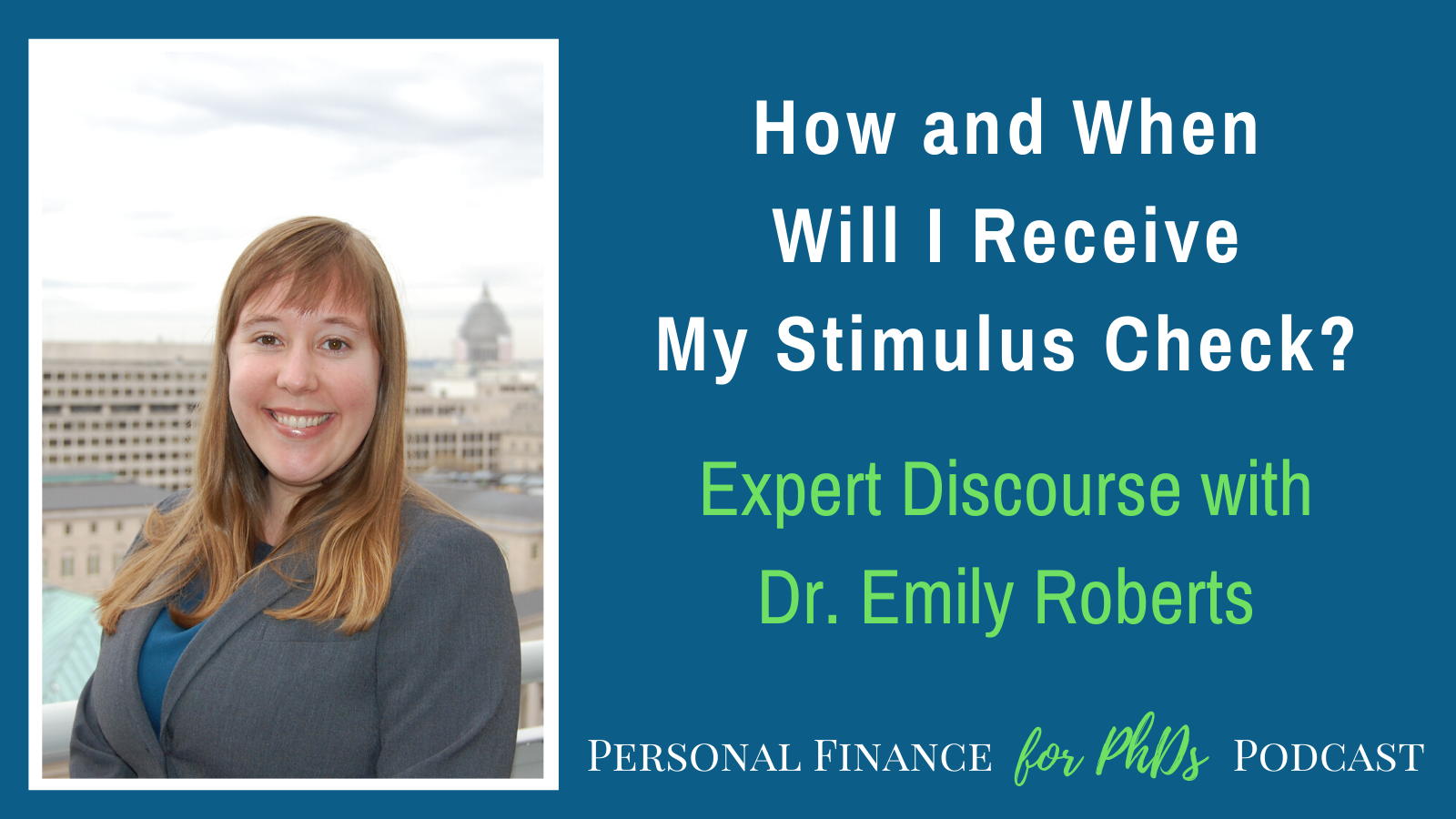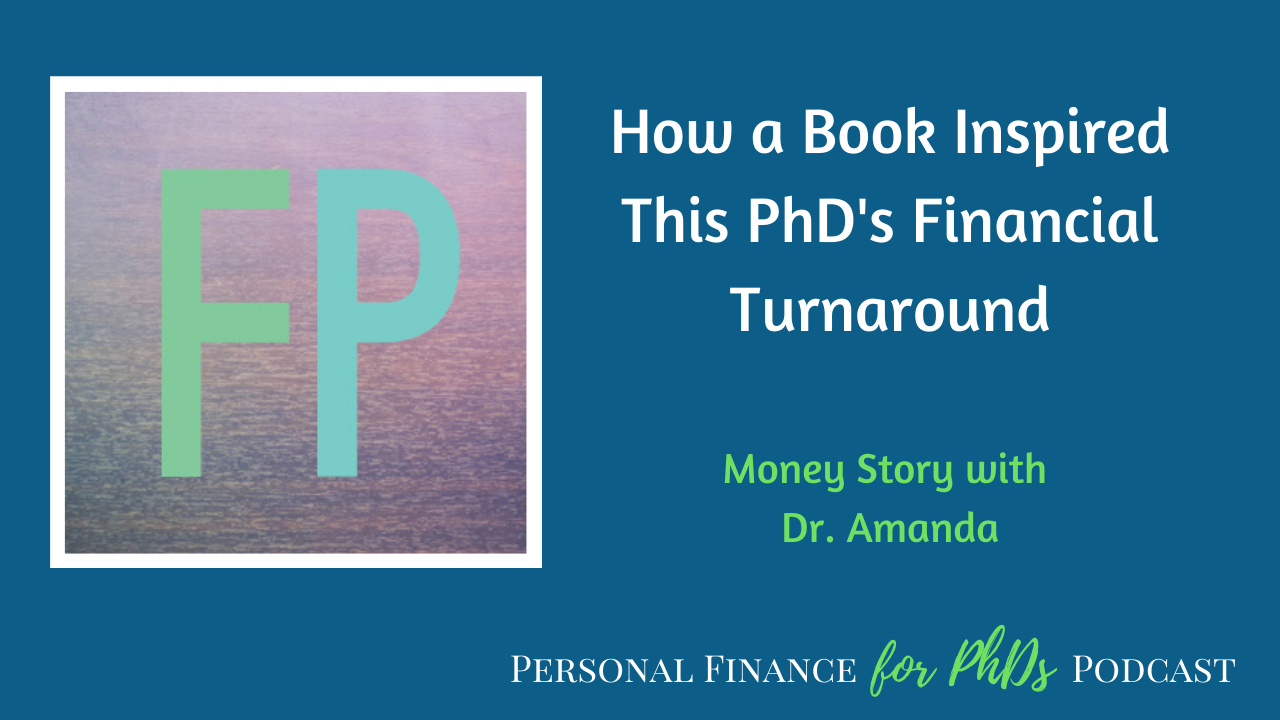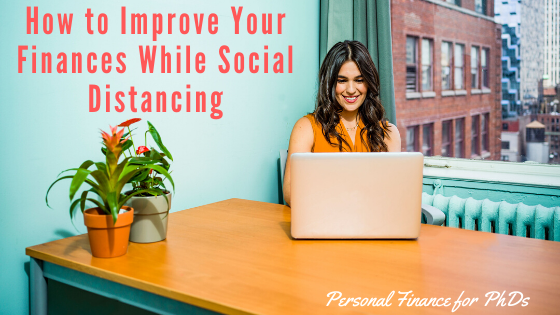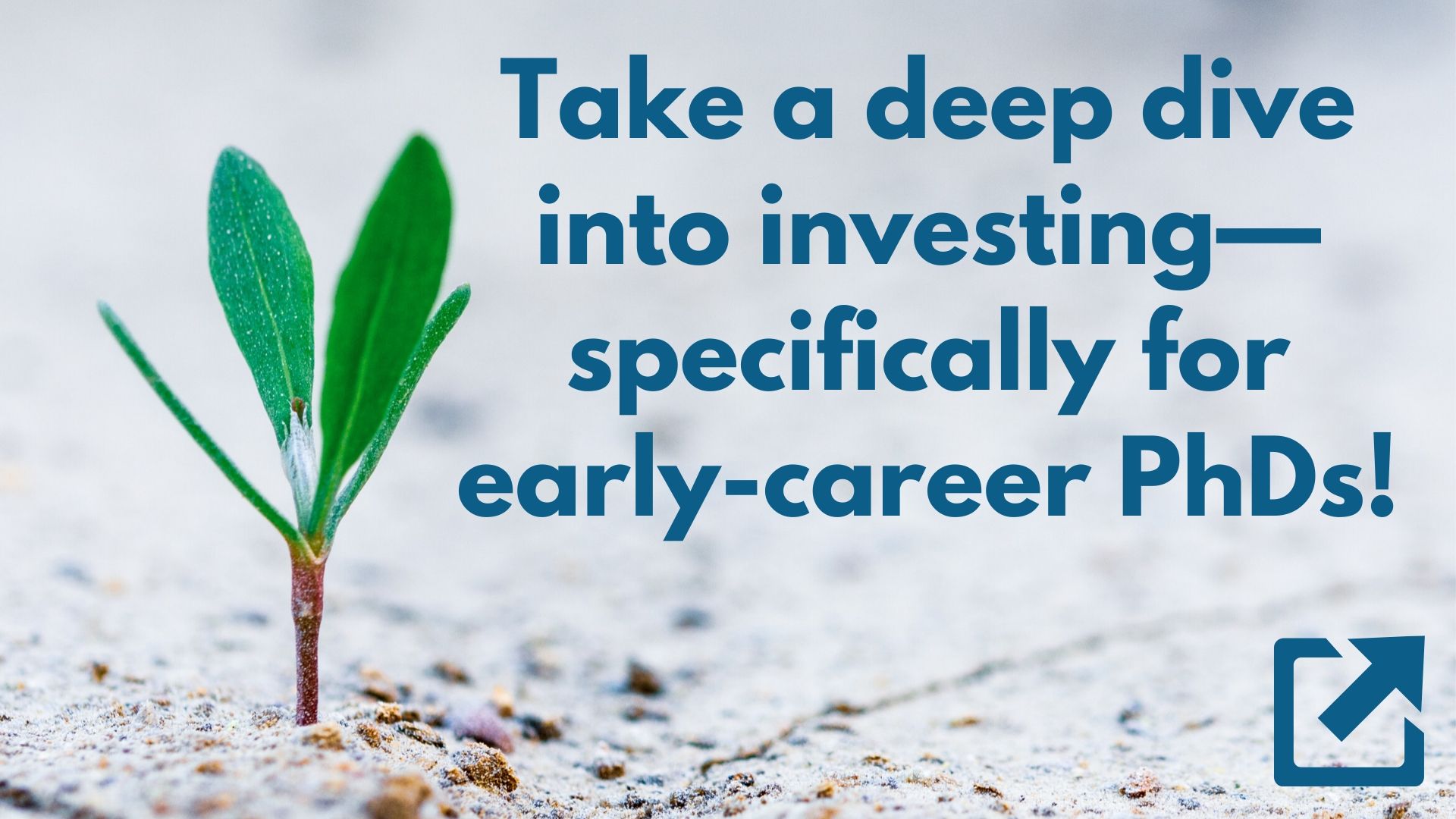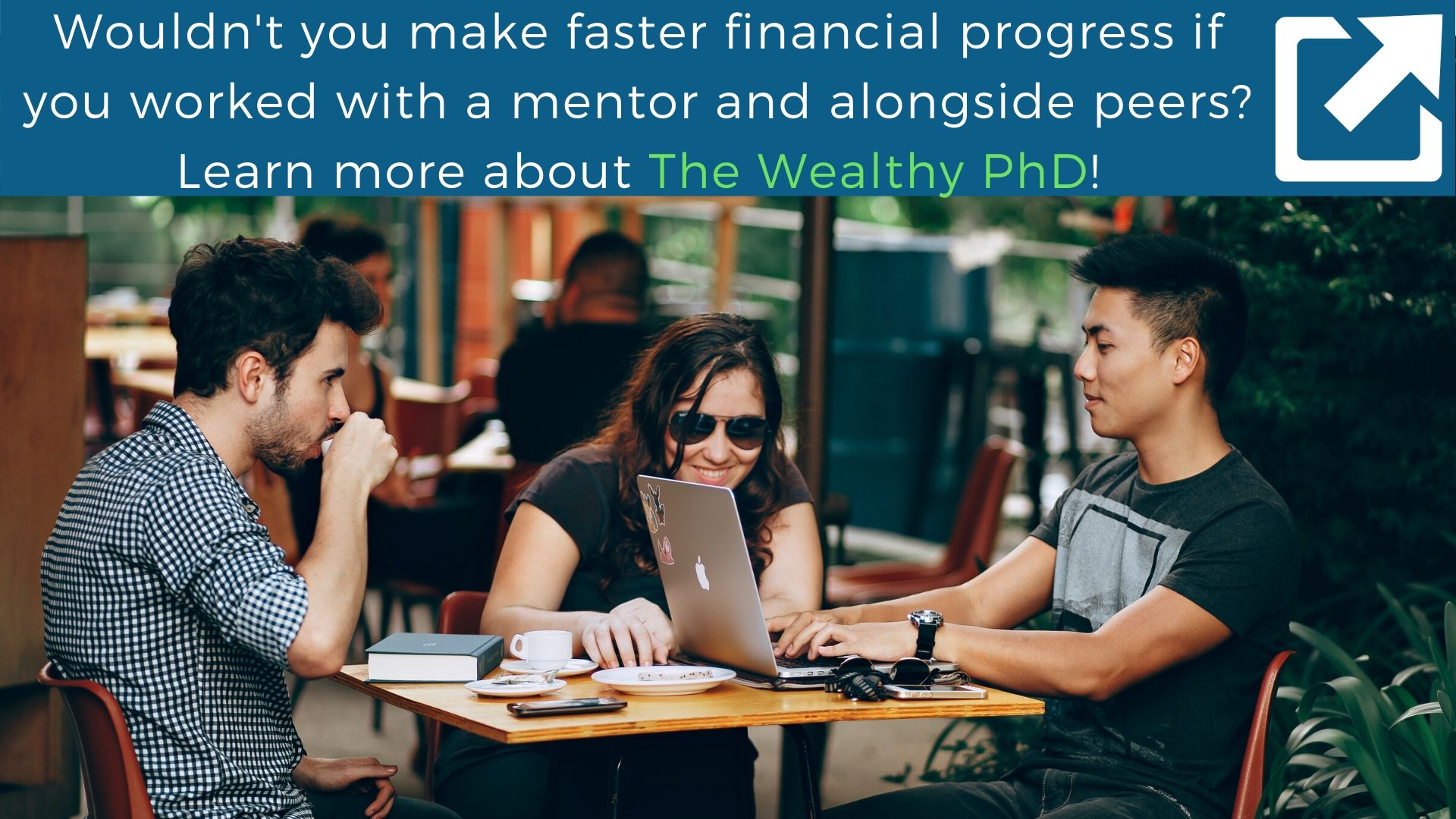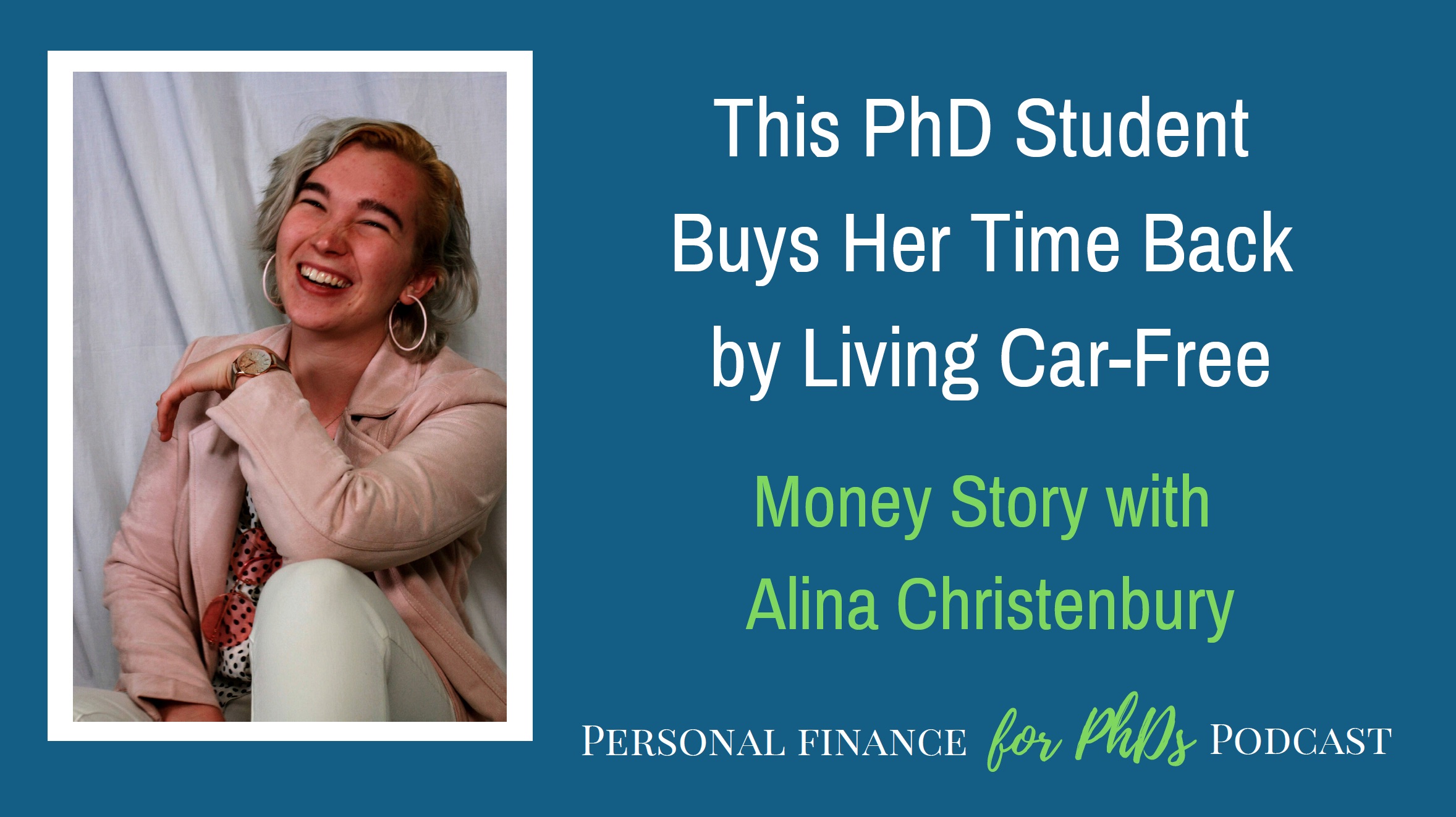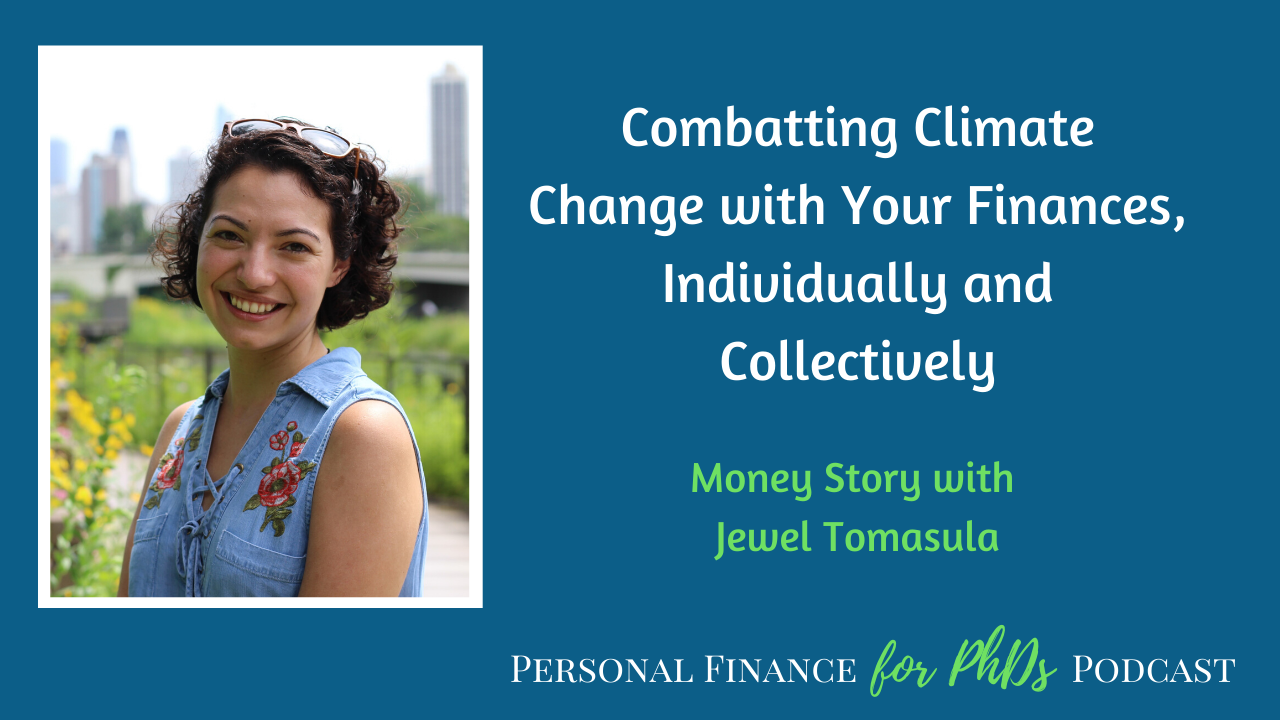In this episode, Emily interviews Kelsey Wood, a National Science Foundation (NSF) Graduate Research Fellow who now teaches others how to write competitive applications for the Graduate Research Fellowship Program (GRFP). They discuss the decisions that new fellows have to make regarding when to start receiving the funding and the internship opportunities available. Kelsey also issues a warning regarding paying quarterly estimated tax and gives great insights from her course for GRFP applicants. At the end of the interview, Kelsey shares her best financial advice for current graduate students and postdocs.
Links Mentioned in This Episode:
- @klsywood (Kelsey Wood’s Twitter Page)
- PF for PhDs Tax Center
- Quarterly Estimated Tax for Fellowship Recipients
- Graduate Research Opportunities Worldwide (GROW)
- Graduate Research Internship Program (GRIP)
- Christine Mirzayan Science Policy Fellowship
- PF for PhDs: Coaching
- Kelsey’s GRFP Website
- PF for PhDs: Subscribe
Further Reading:
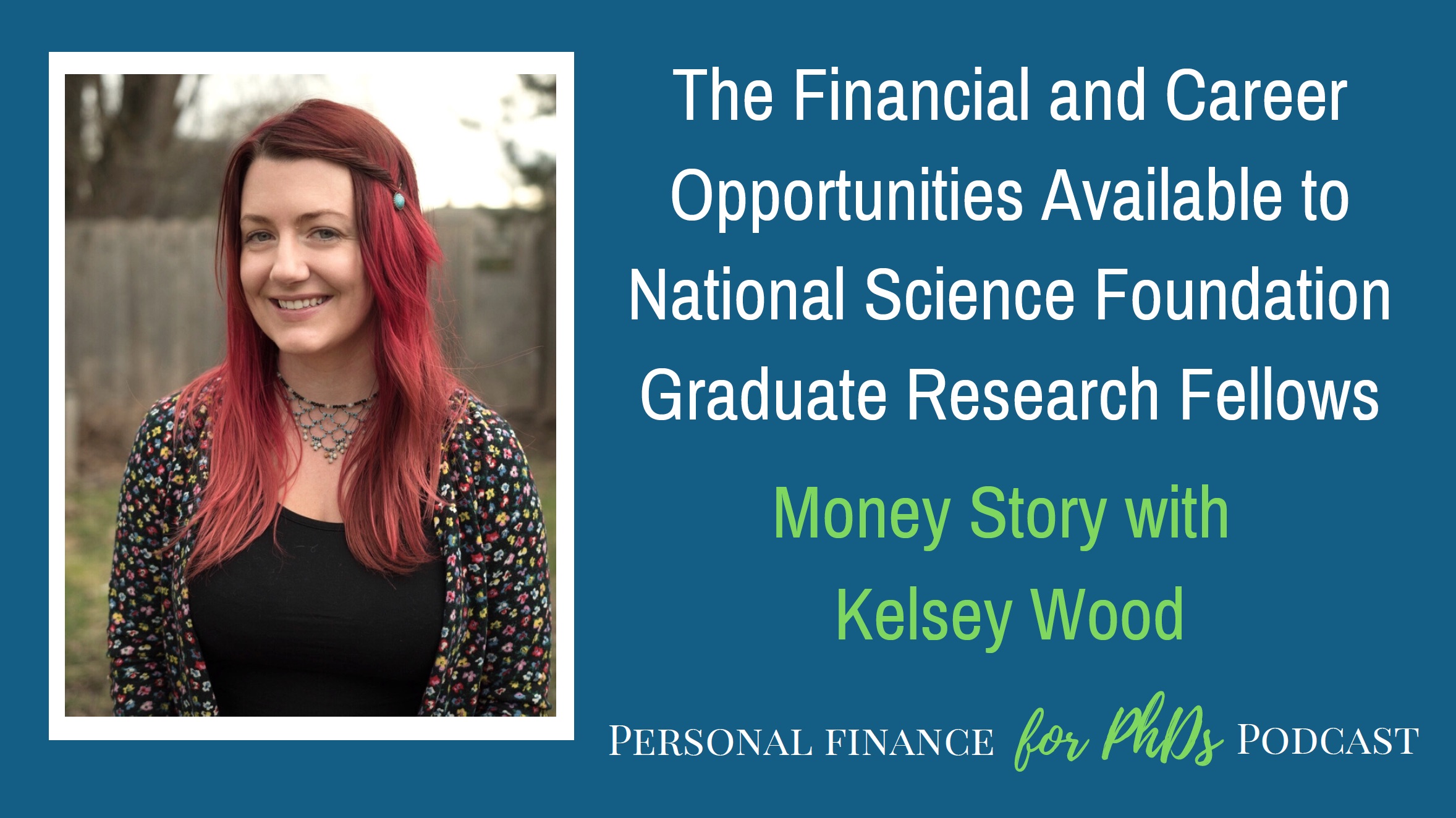
Teaser
00:00 Kelsey: I think that a lot of times the graduate groups or the administration will attempt to get as much free labor out of graduate students as they can, but there is actually a lot of money there to pay people, so I think a lot of times grad students need to be proactive in asking for money for things like leading workshops or teaching classes, TA-ing, et cetera.
Introduction
00:26 Emily: Welcome to the Personal Finance for PhDs podcast, a higher education in personal finance. I’m your host, Dr. Emily Roberts. This is season five, episode 16, and today my guest is Kelsey Wood, a graduate student at UC Davis and National Science Foundation Graduate Research Fellow. We discuss the decisions that new NSF fellows have to make regarding when to start receiving the funding and the internship opportunities available. Kelsey also issues a warning regarding paying quarterly estimated tax. Throughout the interview, she shares her insights into how to best manage your finances as a fellowship recipient. Kelsey now teaches others how to write competitive GRFP applications, and she details some excellent strategies from the online course she developed. Without further ado, here’s my interview with Kelsey Wood.
Will You Please Introduce Yourself Further?
01:15 Emily: I am so delighted to be joined on the podcast today by Kelsey Wood. She is currently a graduate student at UC Davis, and she is also a former NSF GRFP fellow. And she’s going to be talking to us about that program and also the advice that she gives people in her course regarding applying successfully for the application. So, Kelsey, I’m so glad to have you. Welcome! Will you please tell the audience a little bit about yourself?
01:39 Kelsey: Sure. Thanks for having me on. I am a PhD student about to graduate in integrated genetics and genomics at UC Davis and I currently am studying plant pathogen interactions. I got my bachelor’s in biology from Reed College where I studied animal behavior and then I happened to get a job in the biotechnology industry working on potato disease resistance. And I really liked my time in industry, but I found that I was frustrated that I couldn’t pursue my own independent research questions. So, I realized I needed to go to graduate school.
02:14 Kelsey: And so, I applied for the NSF GRFP during my first year. Mostly due to peer pressure from a senior grad student who was a GRFP fellow, and he actually gave a workshop on the fellowship where he basically convinced everyone to apply. And I’m glad I did because I actually got it. And then after I received the fellowship, I decided take over that workshop and also encourage other people to apply and give them tips on how they can actually get it. So, I’ve offered a variation of that workshop for the last five years, and I did an online version last year. I held some free webinars that were attended by over 200 people all across the U.S., and then I also offered an intensive workshop with additional webinars, one-on-one and personalized editing services. Participants said that was really helpful in preparing their applications. And actually, out of the 10 people who submitted in the workshop, three of them got it this year and one honorable mention. So, I’m really proud of them and happy that I kind of helped people to get it.
Kelsey’s NSF GFRP Workshop Updates
03:18 Emily: That’s incredible. Oh my gosh. I would have loved to participate in something like that when I was early on in graduate school. Tell people right up front where can they go to find more information about that course?
03:27 Kelsey: Right now, the best place to probably get updates on what I’m going to be offering it–and I’ll also be posting a lot of the materials–is my Twitter. It’s @klsywd (Kelsey Wood), but without any vowels. So, K L S Y W D.
03:42 Emily: So, it sounds like you were a fellow between your second and fourth years of graduate school. Is that right?
03:49 Kelsey: Let’s see. I started the fellowship–it would have been in June, 2014–the summer before my second year. Yeah.
Major Decision Points for NSF GRFP Recipients
03:58 Emily: Okay. And so, what are the decisions? Okay, so let’s say we’re speaking to one of the people who has just found out that they received the GRF. Amazing, congratulations! But they’re faced with a few decisions either right away or during the course of their tenure. So, can you talk through–kind of give them a little preview, what are those decisions that they need to make, and what are some things they should consider as they’re making them?
When To Start Receiving the Stipend
04:23 Kelsey: Sure. So, I mean the first one is when to start receiving the fellowship stipend. So, you’re technically a fellow for five years, but you’re only receiving the stipend for three of those years and then the other two years you’re on tenure–you’re either on tenure or on reserve. Anyways, you only get paid for three years and then the other two years you just you have additional benefits that you can receive from the fellowship, but you’re not paid any longer. And you can start that at any time. What you really want to consider is potentially what other funding sources you might be encountering during graduate school. For example, there are a number of fellowships that you can get after you’ve passed your qualifying exams, which usually happen second or third year. So, if you think you’re going to be applying and getting those fellowships, it can be really good just to start the GRFP right away.
Consider Timing (and Adequate Payment) for TAships
05:14 Kelsey: And then the other fellowship will take over once your GRFP funding runs out. Some really lucky people got multiple fellowships, actually, right at the beginning. Somebody I knew got the GRFP and the Ford fellowship this year, actually. So, they need to decide which ones, what order to get those because you can’t get them both at the same time. But that’s a pretty lucky problem to have. I would say that. And then the other thing is, some people have to do TAships in order to satisfy a degree requirement. And you can’t do a 50% TAship while you’re doing the GRFP. That’s not allowed. So, you might want to maybe get that out of the way first so you can pass your qualifying exams and have that TA under the thing. What I did is I actually TA-ed for free. But in retrospect, I don’t know if I would make that same decision again because it was a lot of work, and I don’t know. I’ve kind of changed my feelings on just doing things like volunteering and for free because there actually is–I think that a lot of times the graduate groups or the administration will attempt to get as much free labor out of graduate students as they can. But there is actually a lot of money there to pay people. So, I think a lot of times grad students need to be proactive in asking for money for things like leading workshops or teaching classes, TA-ing, et cetera. So, that’s what I found. I started asking for stipends for my workshop and I got them. I started asking for stipends for TA-ing grad level classes. They weren’t offering them before, and I started to get them. So, I think in retrospect I maybe would have tried to get paid for a TAship to meet my degree requirements and then taking the GRFP.
07:09 Emily: It is kind of strange that universities have different policies around who gets paid for doing what exactly, because TA-ing–sort of similar to your situation, but–in the department that I was in, in graduate school, we had what they called, a graduation requirement to TA for two semesters, and it was not tied to our stipend. So, we were all being paid in some manner, either research assistantship or on fellowship or something, but we just had to do this TA work on top of it during a couple of semesters. So, that was the way they structured it. It wasn’t tied to our income. But in other places, of course there are some people who are TAs and that’s their stipend and that’s their funding and that’s the source of it. But then there is even another option that I’ve heard of which is essentially sort of being hired as an adjunct, as a graduate student. So, it doesn’t have to do with your base stipend. That could still come from a fellowship or research assistantship or whatever else. But if you take on an additional class as a TA or even as the lead instructor, you could be paid like an adjunct would be paid. So, different places do things different ways.
Check with Your Advisor About Research Grant Cycles
08:11 Emily: But I think to your original point about deciding, “Okay, when do you want to be paid for these three years when you’re in those three years of having the GRF?” You said that you should think about, “Are you going to be applying for different kinds of fellowships post-quals or post-prelims? Are you going to need this TA thing?” You could potentially get it out of the way first and have your funding come from there, initially. I would also want to throw in there, maybe ask your advisor about research grants, and are they at the end of a grant cycle, the beginning of a grant cycle? Because that could also play into it. You don’t want to take the fellowship when your PI has tons of money and then, you know, three years later, maybe there is no funding there for you. So, that’s a potential risk too. So, it’s just kind of being open about what are all these financial factors within your department, within your group, that could play into this.
09:03 Kelsey: Yeah. And actually, that’s a really good point. Because for a lot of people, getting the GRFP actually influences what lab they can join because you’re coming in with your own funding. So, you might be able to join a lab that you wouldn’t have been able to join otherwise. And in that case, you’d probably want to start using your funding right away. And then, you know, you can essentially help your PI get other grants that will take over once the funding runs out. So, that’s a big benefit.
Are You Listed as a Dependent on Your Parents’ Tax Return?
09:33 Emily: I wanted to add one more point. It’s tax season right now. So, I’m thinking a lot about taxes. And so, this weird thing happens with fellowship funding when you’re under the age of 24. I don’t know how old you were when you first started, were you under 24?
09:48 Kelsey: No, I don’t think so.
09:49 Emily: Okay. Yeah. Because you had had at least one year of work experience. But if you’re starting when you’re 22 or 23, anytime that you have fellowship income in a year when you’re age 23 or younger, some weird stuff can happen with your tax return. Namely, your parents might be able to have more of a claim on you as a potential dependent on their tax return, which is not good for you if it turns out that way. And secondly, you might be hit with this weird high tax called the “Kiddie Tax.”
10:16 Emily: And so, I don’t want to go into all that right now, but if you go to my website, pfforphds.com/tax, there are articles there about both of these issues. But my point is just when you have fellowship income and you’re under the age of 24, sometimes it can have these weird effects of making you pay a lot more in tax than you would normally if you were over the age of 24. So, to me that’s just another factor that I want to throw in there of, “Hey, if you’re under the age of 24, maybe consider delaying a year until you actually turn 24, and then take the fellowship if your alternative is having a research assistantship instead, which is W2 income, which is treated somewhat differently tax-wise. So, more details about that if you want to talk with me about it or read about it more, but I’ll just throw that in there for those of you on the younger side.
25% TAships Possible During GRFP
11:00 Kelsey: That’s a really good point. Oh, and I actually thought of one more thing regarding TAships, which I think a lot of people don’t know–or I didn’t realize at first–is that it usually is possible to get a 25% TAship while getting the GRFP. So, that might be an option if that will satisfy your degree requirement. And the other benefit is that you actually get paid on top of the GRFP additional money for the 25% TAship, and that’s allowed within the GRFP rules. So, it’s just something to consider. I did that for one quarter, and it was really nice.
Financial and Career Opportunities for GRFP Recipients
11:34 Emily: Yeah, I love hearing all of these different ideas. Okay. So again, speaking with a new fellowship recipient, what are some of the financial and career opportunities that come along with receiving the fellowship?
11:46 Kelsey: Well, probably the biggest one is just the fact that the stipend is a lot higher than most standard stipends offered for grad students. And so, that makes a really big difference to be able to afford cost of living, which has really gone up in a lot of places, especially in California. I’m sure other places as well. And then another benefit for your career is that winning one fellowship usually leads to winning additional fellowships and awards. And I think one reason for this is that the reviewers look at your CV and they’re like impressed that you have the GRFP so they are more likely to give you these other awards. And then the other reason is that I think that just the practice of writing the fellowship in grants, you become better and better at it. And so you’re able to write more convincing applications.
12:35 Kelsey: So, for me personally, after I got the GRFP, I won research funds from UC Davis. I got like three or four travel awards for conferences. I got the USDA predoctoral fellowship. And then I also applied for a Dean’s award for mentorship and got that. And I’m pretty sure the GRFP helped me a lot in that. And also writing these and teaching classes on fellowship writing probably helped me also become a lot more convincing. So, that’s a huge benefit for your career.
Get the Snowball Rolling, Start Early
13:05 Emily: I’ll actually add in there that I think it makes a ton of sense, like what you’re doing with your course, or the students in your course, it makes a ton of sense to focus and put so much effort into these really early funding applications like before you enter graduate school in your first, maybe second year of graduate school. You don’t have to say, “Okay, this is going to be my bar for every application I’ll ever do.” But as you said, if you can get that snowball rolling of receiving awards right away in the start, it does make the rest of it easier and is very impressive. It’s a wonderful fellowship to win. So, I’ll just say, go take Kelsey’s course. Or somebody else’s. Just get these resources and make sure that you are putting as much effort as you possibly can into these early applications. And like you said, the skill of writing the application itself, that is something that carries over into the future. So, yeah, when you have your time before you’re deep into your research and you’re still doing your classes or whatever, make time for this. Make it almost like a course in your schedule in that semester that you’re applying. Because it really is worthwhile to put in the effort.
14:08 Kelsey: Yeah. And a lot of people don’t want to apply, for example, because they just don’t think they’re going to get it, for various reasons. And I encourage them just to do it anyways as an exercise. And usually by the end of it, I always ask my students during the course evaluation if they thought that the class was worth it, even if they don’t get the fellowship. And like 95% of them say yes, just because it’s the skill, it’s writing about your research. A lot of times if you’re actually writing about your real research, you can use that GRFP application in other grants or your qualifying exams, which is really useful. So yeah, definitely a good skill to get and to get early. And then if you get it, like you said, it’s just a snowball effect.
Internship and International Travel Opportunities
14:54 Kelsey: I was going to mention just the internship and the international travel opportunities that GRFP fellows are able to apply for. So, I didn’t actually apply to either of these, but I have known people who have done the Graduate Research Opportunities Worldwide, the GROW program, and that just allows you to do like three to six months research abroad. You identify a host in another country and then you apply for it. And I heard it has around like a 50% acceptance rate, and they fully fund your travel and living expenses abroad. So, it’s just a nice way to kind of get some international experience, maybe learn a new technique, or use some instrumentation that’s not available at your home lab. And it’s just another fellowship you can add to your CV.
15:49 Emily: I’m also thinking that that’s just an incredible thing to be able to talk about in future job interviews, or whatever. Just having a different kind of experience that broke up graduate school a little bit. Expanding your network, you know, seeing things from another perspective. It’s in the name, right? It’s a real growth opportunity.
Even Without the GRFP, Talk to Your PI About Collaborations
16:08 Kelsey: And I mean, something to consider too is even if you don’t have the GRFP, if your PI does have enough funding, this is something you could probably set up on your own basically doing research in a collaborator’s lab internationally or in the U.S. So, I think it’s something to consider just to diversify the experience that you get and you can talk to your PI about it and it might be something they go for.
16:34 Emily: Yeah. I know actually one of my labmates while I was in graduate school did the Whitaker Fellowship. I don’t know how subject matter-specific that is, but he was able to spend nine months in East Asia. And yeah, I think it was a great experience.
16:48 Kelsey: Yeah. The NSF has another one too that I think is open to all, not just GRFP fellows, that’s just a travel abroad or research abroad fellowship. There are other ones out there too. So, it’s definitely something to look out for and apply for.
17:03 Emily: Okay. So, that was the GROW fellowship, but there’s another internship program, right?
17:07 Kelsey: Yeah. So, there’s the GRIP program. So, it’s the Graduate Research Internship Program, and that one you do research at a federal agency. I don’t know all the ones, but I know like you can do research in the Smithsonian for example, any of the agencies, basically the governmental agencies.
17:28 Emily: That also sounds like an incredible career opportunity.
17:32 Kelsey: Especially if you want to go into government research. You know, I think that nowadays more and more graduate students are realizing that the academic path of being a professor–there are so few opportunities for that and so many graduate students trying to get those, that a lot of people are considering alternative career paths like industry or government jobs. I had a lot of people who took my class who really wanted their end goal to be to work for a governmental agency and do research in that respect. And actually the NSF really encourages that for GRP applicants. So, I tell people, if that’s their career goal, to write about that in their application.
Timing of Internship Programs During Fellowship
18:16 Emily: Just to add on to that, I think having outside work experience before you actually finish your PhD is incredible for finding whatever your next job is. Even if you decide to stay within academia. Again, it gives you multiple perspectives, broader network. But a question I have about the internship programs, is that something that you have to do during your funded years or is that something you can still do on the remaining two years?
18:39 Kelsey: Yeah, that’s a good question. So, both the international program–the GROW program–and the internship program can be done while you’re on reserve. So, while you’re not receiving the stipend. So, it has to be done within the five-year period of when you first start the fellowship. But yeah, that’s really one of the benefits. And I think the GROW is really something you’d probably want to do towards the end of your graduate career–probably both programs–because one, it’s additional funding? So, maybe your GRFP funding has run out and now you can get some more funding for your travel and living expenses.
Design a Custom Internship
19:16 Kelsey: And then the other thing is that you really are probably better able to identify a lab or a governmental agency that would be a right fit for your research at that point. And actually something else regarding internships is, you know, there was a program at UC Davis that’s like the biotechnology program. It’s like a degree, an “emphasis,” and they require that you do an internship as part of the emphasis. But one thing I realized is, even if you’re not in a program like that or even if you’re not a GRFP fellow, you can a lot of times arrange an internship in industry towards the end of your graduate career. Potentially, the company will fund you to do that, too. And it can be a really good chance to explore these career opportunities.
20:07 Kelsey: A lot of times, if you end up doing a good job, the company will be really excited to hire you and it kind of lets you trial industry or trial a company and maybe contribute something else to your research, too. So, I just have realized that a lot of times you can kind of design your own programs. Obviously, you want your advisor to be on board with this, but a lot of times, especially if you can get funding from the company, then they’re going to be very happy about that and they also want to see you grow in your career. So, I think that’s something that people should consider. Even if you’re not a fellow or even if you don’t have an official program, you can kind of craft your own internships during graduate school.
20:51 Emily: Yeah, I totally agree. I think it’s one of the most powerful things you can do for your career, prior to finishing your PhD, while you know you have something to go back to after the summer ends, or whatever. I actually did a science policy fellowship that was three months, the Christine Mirzayan policy fellowship. It’s at the National Academies. And I did it after I finished my PhD. I applied basically around the same time that I was defending, but it’s open to current graduate students as well. In retrospect, sort of like you, I wish I had done it while I was still in my program and I think it would have informed some of the decisions that I made as I was finishing up. So, internships, great for everyone. I know not everyone thinks that internships are for them. I’m from an engineering field, so it’s sort of more normal to think about doing an internship. And of course in computer science or similar fields like that. But I think it’s expanding and it should expand more to other disciplines where it hasn’t been a traditional part of the PhD path.
Commercial
21:50 Emily: Hey social distancers, Emily here. I hope you’re doing okay. It took a few weeks, but I think I have my bearings about me in my new normal. There is a lot of uncertainty and fear right now about our public and personal health and our economy. I would like to help you feel more secure in your personal finances and plan and prepare for whatever financial future may come. You can schedule a free 15-minute call with me at pfforphds.com/coaching to determine if financial coaching with me is right for you at this time. I hope you will reach out, if only to speak with someone new for a few minutes. Take care. Now, back to our interview.
Financial Advice for Fellowship Recipients
22:36 Emily: So, let’s broaden this line of questioning a little bit. Not just for people who have just received the NSF GRFP, but people who have received it in previous years who are still receiving that higher stipend. And maybe other people who’ve received outside fellowships that also have some stipend augmentation based on that. What’s your financial advice for people who have received one of these lucrative outside fellowships?
File Estimated Quarterly Taxes (NOT Yearly)
23:00 Kelsey: Yeah, so I think the biggest pieces of advice I have are regarding taxes and savings. And so, the thing you should do immediately is start to file your taxes quarterly instead of yearly. And you can estimate how much taxes you’re going to have to pay quarterly so you can start to save up. My personal sob story is that I did not do this the first year and I ended up filing my taxes and I owed about $5,000, which I didn’t have saved up. So, I ended up having to do a payment plan with the IRS which charges interest, actually quite a bit of interest. So, I ended up having to pay way more in taxes than I would have if I had just started filing quarterly. So, do that right away. I know taxes are not fun, but it’s actually not too hard to calculate if you’re only getting the stipend income, and that’s way better than having to owe it.
23:56 Emily: Actually, let me pause there because this is one of my big areas, right? It’s tax for fellowship recipients. So, was that $5,000 just the IRS or was that split between California and federal?
24:08 Kelsey: Oh, yeah, it was California and federal, split.
24:10 Emily: Okay. That’s within the more reasonable realm. Okay. Yeah, definitely. I mean I’ve actually had, I think, two other people interviewed on the podcast who have also set up payment plans with the IRS based on this exact same situation. So, this is not at all uncommon, and it’s one of my big areas of focus is to get this information in front of new fellowship recipients. No longer is income tax–this is the case at almost all universities–no longer is income tax going to be automatically taken out of your paychecks. It’s something you now have to take responsibility for, like you were just saying.
Personal Finance for PhDs Tax Center
24:43 Emily: So, most likely you are going to be required to pay quarterly estimated tax. And I have a ton of materials about this. Again, if you go to pfforphds.com/tax there’s an article there. And in particular, I have actually a workshop for people in just this exact situation. If you go to pfforphds.com/qetax for quarterly estimated tax, it will forward you to my most recent workshop. And probably similar to yours, Kelsey, I have prerecorded videos for that, and I also do live Q&A calls to help people with questions as they come up through tax season. So, just because of when we’re recording this though, I want to add in that part of the response to the coronavirus crisis actually has been to delay the first, like the Q1 payment for 2020. So, just like with your annual tax return, right now, this year in 2020, it’s no longer April 15th, but rather it’s July 15th.
25:34 Emily: So, for those fellows out there, you have a little bit extra time to figure out what’s going on in 2020 regarding your quarterly estimated tax and making those payments. So, the first payment as of this recording is actually due [July] 15th, which is the quarter two payment. But yeah, totally a common story, like you were just saying, Kelsey, is just to not realize the change that had gone on with your income tax and catching up with it when you actually file your annual return and realizing, “Gosh, now I have all this money that I owe to the IRS.” So, how did that payment plan go for you? Like was the increase in stipend more manageable, or what were your tips around saving I guess?
Start Saving Immediately
26:11 Kelsey: Yeah, so I think I’m still paying off some of my taxes monthly for that. So, anyway, just do it ahead of time and you won’t have to worry about it. And then in terms of saving, the other thing is that, because the GRFP stipend is a lot higher than the normal grad student stipend, you can kind of get used to a certain style of living. Like you’re able to go out to eat more or buy more expensive groceries. And then as soon as the stipend stops, it can be kind of a shock. So, what I’d advise doing is actually just start saving almost immediately. And I use automatic monthly withdrawals to a mutual fund. And the benefit there is I don’t see the money. Like it’s just automatic.
27:02 Kelsey: The savings are out of sight, out of mind. And then when I actually really need it I can go and be like, “Okay, here’s how much I have.” And I’ve done that a few times. I used that to fund a vacation to Europe. And so I advise just like setting something up right away and make sure you can’t see the money. Save up for when the GRFP ends, and also just because you have all this extra money that you wouldn’t be getting otherwise, so you might as well save part of it and not just spend it all.
27:33 Emily: Yeah, I definitely echo what you’re saying. And I think especially where you’re living, it’s a high cost of living area. It’s probably already challenging to live just on that GRFP stipend and it’s certainly less than we’d be making if you were having a regular job. But, think about your peers who are somehow probably managing to survive, hopefully without debt, on that lower stipend level and see if you can maybe keep your fixed expenses, like your housing, your transportation, at that lower level, so that if your income does drop after the fellowship ends, you don’t have to move or you don’t have to sell your car. Or you can adjust the groceries and adjust the restaurant spending. And it’s much easier and more palatable than having to go through those more major upheavals. So, I totally agree with what you’re saying.
Stipend Negotiations and Bonuses for Fellowship Recipients
28:19 Emily: So, something I know that some fellowship recipients do–and it sounds like maybe you didn’t or maybe it wasn’t possible for you–is that once they know that they’re receiving the fellowship, they actually negotiate to have their stipend stay at that fellowship level. Even after it ends, instead of going back down to the baseline level. Or, alternatively, sometimes programs give out one-time bonuses to fellowship winners. Have you heard about that or have any experience in that area?
28:47 Kelsey: It’s something I thought about asking my PI, because after the fellowship ended, I was struggling a little bit, financially. I ended up doing the 25% TAship to recover that income. But I do think that, I mean it’s really going to depend on your PI and their sources of funding, but it is something that is possible, potentially.
29:15 Emily: Yeah. I think it’s kind of a “no harm in asking” situation. And actually, if you happen to receive this fellowship when you’re not yet committed to a program, so prior to starting your first year of graduate school, that is something I would take to every program that you’re heavily, heavily considering, saying, “Okay, I got this fellowship. Can you augment, can you extend the guarantee?” Like what more negotiation room is there now that you’re bringing in all this money for them, right?
29:46 Kelsey: I mean, exactly. You’re bringing in just about a hundred thousand in your stipend dollars alone, not to mention tuition and fees. So, it is pretty lucrative. It’s lucrative for a program and a lab to want to accept you because you’re coming in with all this money and you just asking like, “Oh hey, can I get an extra $5,000 a year?” When you’re bringing in $100,000, it’s really still a pretty good deal for them. So, I definitely encourage people to do it. I’d love to hear if anyone is successful at this.
Details on Kelsey’s NSF GRFP Course
30:17 Emily: Yeah, I always want to hear negotiation stories. Absolutely. Email or tweet me those. So, let’s hear more about your course and the content that you create there. You said the best place to find out more about that is your Twitter, could you repeat your handle?
30:34 Kelsey: Sure. It’s @ K L S Y W D (@klsywd). So, it’s my name without any vowels. It’s pronounced Kelsey Wood.
30:41 Emily: So, tell us a little bit more about the structure of the course. I know you’ve mentioned this a little bit upfront, but last year for example, you ran it between what month and what month and you know, what goes on in that time period?
30:53 Kelsey: Yeah, so one of my biggest pieces of advice for the GRFP is to start it early. So, it’s due in like October now. And if you’re on the quarter system, like UC Davis, classes start at the end of September. So, it’s basically due during the first month of classes and it’s also your first month of grad school. So, you’re either just starting in a lab or doing rotations, and that month is just crazy. So, if you don’t start the fellowship early, it’s going to be really hard to do it all and do it well. So, my course actually starts in August, so then you have kind of a full month to start to think about stuff, outline it.
31:35 Kelsey: And then you have September to really refine it before classes start. And then we do all the final drafting and editing in October. So yeah, my course is a three-month thing. And that’s one of the benefits of doing it online. I wasn’t able to start in August at UC Davis because not everyone had come to Davis yet because it was still summer. So, doing it online, I was able to get people just at least starting to think about it and getting ideas rolling. And so, what I do is I had four different webinars on different topics. So, I covered the two NSF criteria, which are intellectual merit and broader impacts. Basically like a full 45-minute webinar on both of those topics. And I think that’s really important because especially the broader impacts one is really confusing to a lot of people.
Focus on Broader Impacts, Know Your Audience
32:27 Kelsey: It’s something that you pretty much probably have never heard of until the NSF fellowship. And it’s a really important part of that fellowship, too. So, I really emphasize the importance of that. And also, it’s really important that you get broader impacts experience before you apply. And if you’re starting the application early or even people who are listening to this, thinking about applying for next year, should basically right now find some activity that you can do that you can write about in your broader impacts section. So, volunteering, outreach, teaching, et cetera. Because if you don’t have any experience, you’re not going to get it. And then I also do a webinar on writing tips. The biggest one that I’ve learned in all my years of writing is probably just like really knowing your audience and writing for them.
33:21 Kelsey: So, you really want to just imagine who’s reading it and who they want to fund, and you really want to just be that person that they want to fund. I help people do that in their essays. Something else that’s really interesting, and it actually might be a regional difference, is in the way that you want to sell yourself in these essays. So, a lot of people are really understated or humble, and I’m like, “No, you have got to really come off like a rock star and show off all the awesome things that you’ve done.” And apparently, somebody told me that that’s actually frowned upon in the UK or in Europe to do that in your grants.
34:10 Kelsey: But in the U.S., at least, it seems to be more popular or more of a winning technique. And so, the other part of the course is that I read people’s essays and give them a ton of tips and just help them write it and rewrite it to just have a better chance of getting the fellowship. And I also set up peer editing groups, too. And I do think that that’s something you want to do, if you take a class or not. Just find somebody who, especially who’s experienced with the NSF, and have them read your proposal and give you feedback. So, for example, when I applied, I was really lucky to have a former NSF reviewer read my application and give me feedback. And he pretty much destroyed my initial draft. It was red everywhere and he’s like, “Get to the point. Be more concise. This is too vague.” And so, I kind of have internalized his feedback and I use that now when I’m editing people’s essays.
35:13 Emily: Yeah, that sounds incredible. Thanks so much for telling us about the course. And were there any other tips you wanted to add in? I know you just gave several already, but any others?
35:23 Kelsey: I guess the last one would also just be to read a lot of example essays, too, for inspiration. And there are a lot out there. I have my own personal collection. I actually have quite a few in my personal collection that I share with people in the course. And then the ones that are okay to share publicly, I’ll probably be posting on my Twitter or on my website once I get that up.
Best Financial Advice for Early-Career PhDs
35:46 Emily: Yeah, that sounds great. Well, Kelsey, thank you so much for joining me for the interview today. And final question that I ask of all my guests is what is your best financial advice for another early-career PhD?
35:59 Kelsey: Well, I think the number one is to apply for fellowships and you know, cast a wide net and apply for anything that you’re eligible for, pretty much. I think it’s totally worth it. I have a quote that’s from that previous grad student who helped with the NSF workshop, which is, “You win 0% of the fellowships you don’t apply for.” So, I think it’s worth it. You can do it. And I guess the other thing is that I think it is important to consider the cost of living and the stipend amount when you are choosing a graduate school. I don’t know. This wasn’t really made apparent to me. And you know, you’re just like, “Oh no, you just choose the best school or the best lab.” But there is kind of a range in stipends across the U.S. and cost of living. So, I think it’s something to really consider because your finances are a part of your happiness in grad school. So, apply for fellowships, and consider that.
36:58 Emily: Totally, totally concur. Absolutely. Well, Kelsey, thank you so much for joining me today and telling us more about these decisions that come up for GRFP recipients and your own experience and about this fabulous course. Thank you.
37:10 Kelsey: Yeah. Thank you.
Outtro
37:12 Emily: Listeners, thank you for joining me for this episode. Pfforphds.com/podcast is the hub for the Personal Finance for PhDs podcast. There, you can find links to all the episode show notes and a form to volunteer to be interviewed. I’d love for you to check it out and get more involved. If you’ve been enjoying the podcast, please consider joining my mailing list for my behind-the-scenes commentary about each episode. Register at pfforphds.com/subscribe. See you in the next episode! And remember, you don’t have to have a PhD to succeed with personal finance, but it helps. The music is Stages of Awakening by Podington Bear from the free music archive and is shared under CC by NC. Podcast editing and show notes creation by Meryem Ok.
